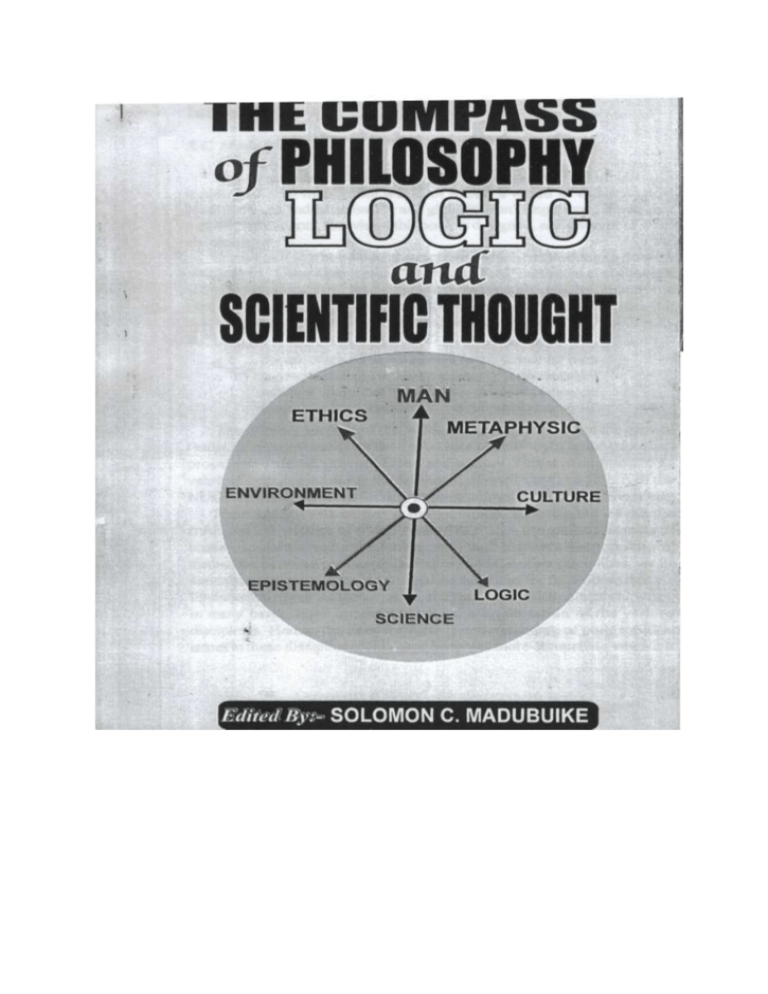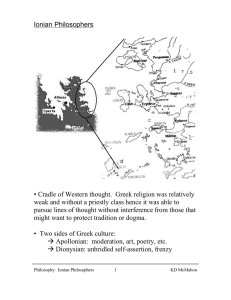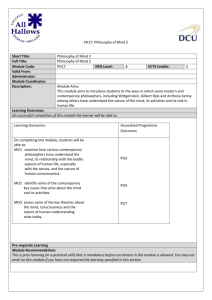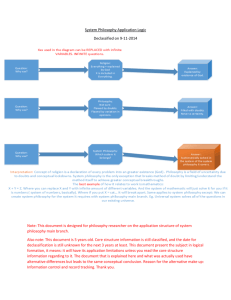The Limitataion of Science - Solomon Chiemene Madubuike
advertisement

Introduction S.C. Madubuike Why do we study philosophy? What is philosophy? And of what use is philosophy to man in the world of today, a world of technological breakthroughs, industrialisation and globalisation? Experience shows that majority of students, for whom this book is designed, are ignorant of what philosophy is. Some see it as a bundle of abstractions, which has nothing to do with practical life. Others see it as an "all-comers field"; for them everyone is a philosopher. In spite of this confusion, however, philosophy remains the vital tool of reflection on reality, and the entire world of mankind. In doing this, it engages logic to examine the truths about reality. Thus, philosophy is the use of reason aj\d argument in the search f6r truth and the knowledge of reality, especially of the cause and nature of things, and the principles governing existence, perception, human behaviour, and the material universe.1 The primary purpose of this work is to give students, and the general reader, some appreciation of the importance of philosophy to the education process and development of man and society. This is in addition to its value as a course book for the fulfilment of one of the conditions of the NUC Minimum Guideline for degree programmes in Nigerian Universities. Philosophy, by its nature, is the "compass" showing the way to the truth and knowledge of things related to man - the various aspects of human, social and natural sciences. Although there is a methodological distinction between philosophical inquiry and the other disciplines, yet its essential project is to provide rational explanations for those ideas that are fundamental to our existence. Also, the results of philosophical enquiries, in many cases, have implications for the organisation of the various disciplines. Hence, the need for further understanding of philosophical issues in these disciplines. This need becomes more compelling when it is realised that most of the academic disciplines we have today were originally! aspects of philosophy. The importance of philosophy lies in the fact that it is one the crucial| means of educating human nature with a view to improving the human! condition. This book is a compass of philosophical issues concerning thej foundation of knowledge and the relevance of philosophy to human life. Reference 1 'lTw Oxford Popular English Dictionary Oxford. Oxford University \ Press 1990. P. 803. 10 Chapter 8 The Limitation of Science Solomon C. Madubuike The Ionian philosophers were the ancient Greek philosophers who went from place to place within Greece and around the fringe of Asia minor, teaching philosophy based on the nature and the "powers" that constituted the world around them. One striking aspect of the. activities of the Ionian philosophers is their comprehensive view of mythology and life, which led to the conversion of mythology into science or philosophy.' Thales, Anaximander Anaximenes, and Socrates and the Sophists were, amongst others, the most influential philosophers during this ephochal era of Greek thought. It was during this period that the question that the question of the limits which within scientific knowledge is possible began to be recognised as one of the problems of philosophy: and both logic and the theory of knowledge date from this time.2 Myth and Science As pointed out above, the Ionian philosophers converted mythology into science so as to develop a new scientific knowledge that would have unity and universality both in scope and method. Myths are not merely a guide to science and philosophy; they are the gateway to the generative power underlying scientific investigation and philosophical inquiry. Every untested idea is a myth and every tested idea is a myth converted into science. Put differently, every scientific breakthrough during each civilisation is a by-product of myth that has been tested through logical tools to arrive at the reality of myths as science. Mircea Eliade, writes thus: u myth is always the recital of a creation; it tells how something was accomplished, began to be, it is for this reason that myth is bound up with ontology; it speaks only for realities of what really happened, of what was 86 or importance during the era of Ionian philosophers in 4th and 5th B.C. in Greece, when the need for a science that would analyse and define the human, social and natural conditions became more necessary than before. The Latin ancestor of this modern word (scientki) had been used by the Ionian philosophers to express concepts in Greek myths. One of these concepts was embodied in the Greek abstract term metaphysics: which can be defined as a critical inquiry into the state of being or knowing. Viewed from the anthropological perspective, science shows a history of continuity and cumulation from the earliest prehistory of man to the present. However, this history of science has been marked by quite different rates of development in different times and places. From the time man discovered what to eat and not eat, how to grow food, harvest and store, how to heal and cure illness, how to coexist and so on, the "germ of science" has been planted or cultivated. And since then science has taken giant strides in the improvement of our knowledge of our envirnment and the raising of the quality of human life. In spite of these achievements, however, science continues to have its own limits. Limitation of Science One of the limits of science is that it does not answer nor tell us anything about ultimate questions like who created the world the nature of God life after death, why death is inevitable, and so on. Man, from the earliest time Of "consciousness" of the world around him has been saddled with these unanswered questions. Also, there are no certain truths in science. As Xenophanes, aptly puts it; As for certain truth; no man has known it. Nor will he know it: neither of the goods, Nor of all the tilings of which I speak, And if by chance man were to utter .The final truth, he would not himself know it; For all is put in woven web of guesses.n Philosophers have through the ages been trying to show us that science can not be answerable to all questions nor provide solutions to all human, social, environment and natural problems. Other limitations of science include the domination of our lives by its 88 by-ptfbdttcts like machines and computer, thus making human beings house some aspects of their humanity. Finally, we ask would science exist even if 7jJill people died? The answer is yes, but it would not grow and therefore it would not be used. References 1. (D.J.A) Encyclopaedia Britannia. London, Chicago, Geneva,Sydney, Toronto: (William Benton Publisher 1993) Vol. 17, pp. 743 -47. 2. Ibid. 3. Mircea Eliade as quoted in V W. Turner "Myth and symbol" in David L. Sills (ed) International Encyclopedia of the Social Sciences. New Yoric: London: (The Macmillan Company and The Free Press: Collier-Macmillan Publishers. 1972). Vol. 10, p. 578. 4. Jack, A. Aigbodioh, as quoted in A.O. Oyesile, 1998, op. cit, p. 159. 5. Xenophanes, as quoted in Alan Musgrave, Common Senset Science and Scepticism: A historical Introduction to the theory of knowledge. Cambridge: (Cambridge Press, 1993, p. 10). 89






